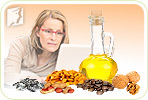Experiencing difficulty concentrating during menopause can leave many women scratching their heads as to what is going on and if it will ever go away. Fortunately, equipped with the right tools, women can improve concentration and restore their cognitive sharpness in no time.
Continue reading to discover the best treatments for concentration problems so that you can disperse the brain fog and go back to feeling like yourself again!
Three Approaches to Treating Difficulty Concentrating
There are three approaches to improving concentration that might prove helpful during menopause: (1) Lifestyle changes, (2) Alternative medicine, and (3) Medications. Because lifestyle changes carry no risks, women are encouraged to begin with them and move on to more conventional treatments only if necessary.
Lifestyle Changes for Difficulty Concentrating Treatment

The first tier of concentration problems treatment calls for the greatest time commitment, but entails virtually no risks. It involves making healthy lifestyle adjustments that can benefit not only concentration, but also overall health.
Nutritious Diet
How to improve concentration is not possible without first giving the brain the nourishment it needs. A healthy menopausal diet consists of ample amounts of foods rich in healthy fats, complex carbohydrates, lean protein, and the following nutrients:
- Phytoestrogens are plant-based compounds that promote hormonal balance and treat difficulty concentrating by mimicking the action of estrogen in the body.
Soy, flax, yams, oats
- B vitamins, particularly B6 and B9, play an important role in brain function and cognitive performance, including focus and concentration.1
Legumes, nuts, bananas, fish
- Vitamin D is necessary for proper nervous system function. Some studies have suggested that vitamin D deficiencies may lead to problems with concentration and memory.2
Salmon, cheese, eggs, fortified cereal
- Omega-3 fatty acids were subjects of numerous scientific studies, which showed their beneficial effects on memory, thinking skills, and concentration.3
Nuts, cold-water fish, flaxseed, sachainchi
When drank occasionally and in moderation, caffeine may increase concentration and alertness. However, it is not recommended for use as a concentration-enhancing supplement long-term.
Regular Exercise
Numerous studies have shown that regular exercise not only benefits physical health, but also cognitive functions.4 It boosts blood flow to the brain and increases neuroplasticity, thus improving focus and concentration.
Amount: To treat difficulty concentrating, prevent weight gain, and optimize health, women are advised get 150 minutes per week of low to moderate physical activity, or 75 minutes of vigorous workouts weekly.5
Type: The best results in terms of improving concentration and focus occur from combining moderate aerobic workouts, like dancing or jogging, with resistance training, including free weights or resistance bands.
Useful tips: To make an exercise regimen stick, take the time to experiment with various workouts in order to find ones most enjoyable. Even brisk walking or bike riding are good places to start.
Precautions: Since the risk of osteoporosis increases with age, menopausal women should avoid strenuous workouts or injury-prone sports, like jumping rope or heavy weight lifting.
Wholesome Habits
In addition to a nutritious diet and regular exercise, middle-aged women are encouraged to put in practice various wholesome habits that will help them give their brains what they need to perform at their best. Consider the following:
Relieving stress - through meditation, conscious breathing techniques, or biofeedback- is an absolute must when it comes to increasing concentration, optimizing cognitive performance, and controlling distractive thoughts.6
Getting adequate amounts of sleep by maintaining a regular bedtime schedule and creating a sleep-conducive bedroom environment is crucial for treating difficulty concentrating.7
Applying concentration-improving techniques can help women get their chores done with more ease. They include eliminating distractions, maintaining a to-do list, or taking frequent breaks when working or studying.
- Quitting addictions is key to improve concentration. Long-term smoking and excess alcohol drinking are linked to significant cognitive decline and increase risk of dementia.8,9
Alternative Medicine for Difficulty Concentrating Treatment

The second tier of treatments for concentration problems involves alternative medicine, particularly herbal supplements.Theyconstitute a low-risk, easy-to-follow option that tackles the root cause of difficulty concentrating during menopause, hormonal imbalance.
There are two kinds of herbal supplements that might be beneficial for increasing concentration: phytoestrogenic and hormone-balancing supplements.
Phytoestrogenic Supplements
Phytoestrogenic supplements, like ginkgo biloba, contain phytoestrogens, which are compounds whose function is similar to that of estrogen in the body. As a result, they compensate for its low levels during menopause, thus promoting equilibrium and treating difficulty concentrating, memory lapses, and other symptoms.10 However, their extended use can make the body less capable of producing its own hormones, leading to further imbalance.
Hormone-Regulating Supplements
Hormone-regulating supplements, like Macafem, do not supply the body with outside hormones. Instead, they act directly on the endocrine glands, nourishing them and stimulating their optimal hormonal production. By that, they help treat concentration problems and many other symptoms of menopause.11 Thanks to their natural and gentle effects on the endocrine system, they are considered one of the safest and most effective long-term treatments.
From Nature and Health Magazine, Dr. Chacon says:
"Macafem's nutrients help restore natural hormones in women. Unlike hormone drugs, which are basically resumed in taking synthetic hormones, Macafem acts totally different in your body. It nourishes and stimulates your own natural hormone production by inducing the optimal functioning of the pituitary and endocrine glands." Click on the following link if you wantto learn more about Macafem.
A combination of lifestyle changes and herbal supplements is oftentimes the most effective treatment for concentration problems in menopausal women. However, a doctor may recommend prescription medications in the case of severe symptoms.
Medications for Difficulty Concentrating Treatment

The third stage of treatments for difficulty concentrating typically entails the highest risks and cost. It should, therefore, be evaluated on an individual basis. Nevertheless, medications for improving concentration may be necessary for women with extreme problems.
The most common medications for treating concentration problems during menopause include the following:
Hormone Replacement Therapy (HRT)
HRT used to be the gold standard in treatment for difficulty concentrating and other menopause symptoms. It contains estrogen, progesterone, or their combination, which can effectively relieve discomforts. However, since the discovery of its side effects and increased health risks involved in its use (shown in the studies below), HRT is generally reserved for severe menopause symptoms.
Other Medications
Medications to increase concentration in menopausal women generally belong to a class of drugs called nootropics, or cognitive enhancers. The most common type involves those used to treat attention deficit hyperactivity disorder (ADHD), like lisdexamfetamine. It can also help middle-aged women improve their focus and concentration. However, because their use may lead to dependency and other side effects, caution is advised.
The aforementioned three tiers of concentration problems treatments are not mutually exclusive. As such, women can naturally move between them according to their needs. However, many find that a blend of wholesome lifestyle practices and herbal supplements is the most effective approach to improving concentration, without relying on medications.
A Safe Way of Treating Difficulty Concentrating
Implementing Lifestyle Changes:
- Eating foods rich in omegas, B vitamins, and phytoestrogens
- Combining regular aerobic exercise with resistance training
- Relieving stress and maintaining a healthy sleep schedule
- Quitting smoking and excessive alcohol drinking
And Taking Herbal Supplements:
- Phytoestrogenic herbal supplements, like gingko
- Or natural hormone-regulating supplements, like Macafem
Sources
- Advances in Physiology Education. (2016). Attention span during lectures: 8 seconds, 10 minutes, or more? Retrieved May 15, 2020 from https://www.physiology.org/doi/full/10.1152/advan.00109.2016
- Aging Health. (2012). Common dietary supplements for cognitive health. Retrieved May 15, 2020 from https://www.ncbi.nlm.nih.gov/pmc/articles/PMC3311304/
- Alcohol and Drug Foundation. (2020). Nootropics. Retrieved May 15, 2020 from https://adf.org.au/drug-facts/cognitive-enhancers/
- Life Sciences. (2004). Estrogenic Activities of Ginkgo Biloba Extracts. Retrieved May 15, 2020 from https://pubmed.ncbi.nlm.nih.gov/14706564/
- Neuropsychopharmacology. (2017). Lisdexamfetamine Effects on Executive Activation and Neurochemistry in Menopausal Women with Executive Function Difficulties. Retrieved May 15, 2020 from https://www.ncbi.nlm.nih.gov/pmc/articles/PMC5399233/
- Oregon State University. (2014). Vitamin B6. Retrieved May 15, 2020 from https://lpi.oregonstate.edu/mic/vitamins/vitamin-B6
Footnotes:
- American Journal of Clinical Nutrition. (2000). B Vitamins, Homocysteine, and Neurocognitive Function in the Elderly. Retrieved May 15, 2020 from https://pubmed.ncbi.nlm.nih.gov/10681269/
- Neurology. (2014). Vitamin D and the risk of dementia and Alzheimer disease. Retrieved May 15, 2020 from https://n.neurology.org/content/83/10/920
- Global Council on Brain Health. (2019). The Real Deal of Brain Health Supplements. Retrieved May 15, 2020 from https://www.aarp.org/content/dam/aarp/health/brain_health/2019/06/gcbh-supplements-report-english.doi.10.26419-2Fpia.00094.001.pdf
- Frontiers in Medicine. (2019). Is there a preferred mode of exercise of cognition enhancement in older age? Retrieved May 15, 2020 from https://www.frontiersin.org/articles/10.3389/fmed.2019.00057/full
- American Heart Association. (2018). Recommendations for Physical Activity in Adults and Kids. Retrieved May 15, 2020 from https://www.heart.org/en/healthy-living/fitness/fitness-basics/aha-recs-for-physical-activity-in-adults
- Harvard Medical School. (2018). Protect your brain from stress. Retrieved May 15, 2020 from https://www.health.harvard.edu/mind-and-mood/protect-your-brain-from-stress
- Sleep Foundation. (n.d.). How Lack of Sleep Impacts Cognitive Performance and Focus. Retrieved May 15, 2020 from https://www.sleepfoundation.org/articles/how-lack-sleep-impacts-cognitive-performance-and-focus
- National Institute on Alcohol Abuse and Alcoholism. (2001). Cognitive Impairment and Recovery from Alcoholism. Retrieved May 15, 2020 from https://pubs.niaaa.nih.gov/publications/aa53.htm
- American Journal of Epidemiology. (2007). Smoking as a Risk Factor for Dementia and Cognitive Decline: A Meta-Analysis of Prospective Studies. Retrieved May 15, 2020 from https://pubmed.ncbi.nlm.nih.gov/17573335/
- Advances in Therapy. (1998). Clinical Improvement of Memory and other Cognitive Functions by Ginkgo Biloba: Review of Relevant Literature. Retrieved May 15, 2020 from https://pubmed.ncbi.nlm.nih.gov/10178638/
- Evidence-Based Contemporary Alternative Medicine. (2016). Preservation of Cognitive Function by Lepidium Meyenii (Maca) is Associated with Improvement of Mitochondrial Activity and Upregulation of Autophagy-Related Proteins in Middle-Aged Mouse Cortex. Retrieved May 15, 2020 from https://pubmed.ncbi.nlm.nih.gov/27648102/
- JAMA. (2002). Risks and benefits of estrogen plus progestin in healthy postmenopausal women: principal results from the Women's Health Initiative randomized controlled trial. Retrieved May 15, 2020 from https://www.ncbi.nlm.nih.gov/pubmed/12117397
- The Lancet. (2019). Type and timing of menopausal hormone therapy and breast cancer risk: individual participant meta-analysis of the worldwide epidemiological evidence. Retrieved May 15, 2020 from https://www.thelancet.com/journals/lancet/article/PIIS0140-6736(19)31709-X/fulltext



